Making matzo the hard way
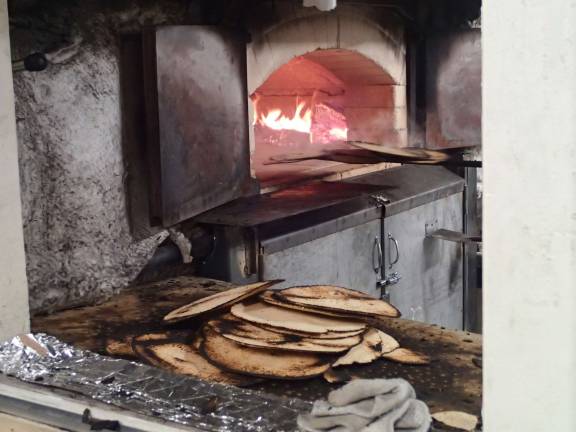
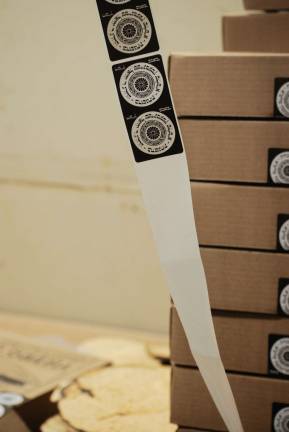
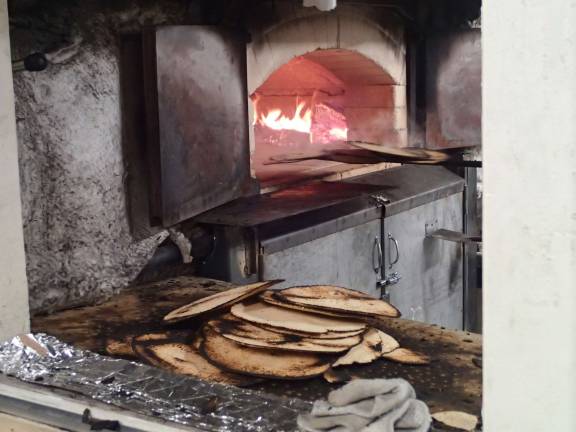
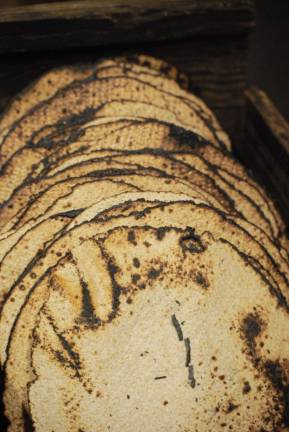
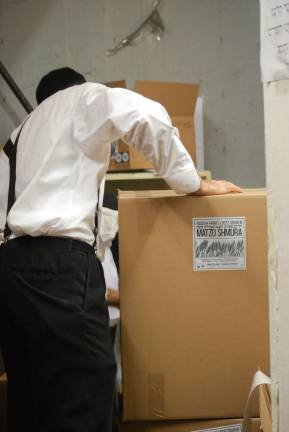
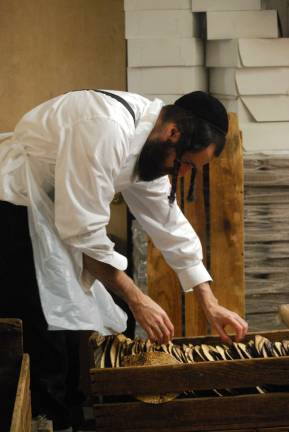
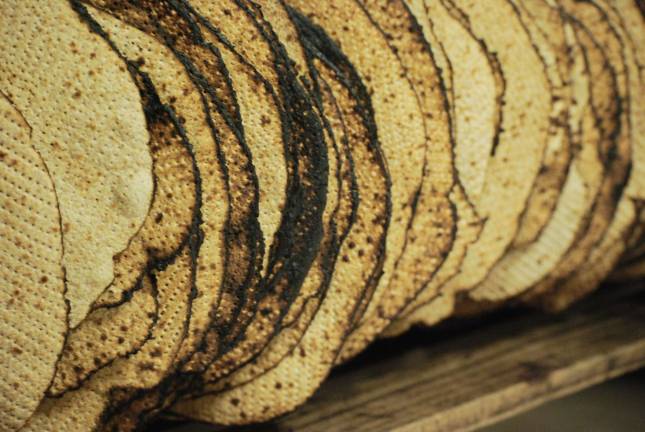
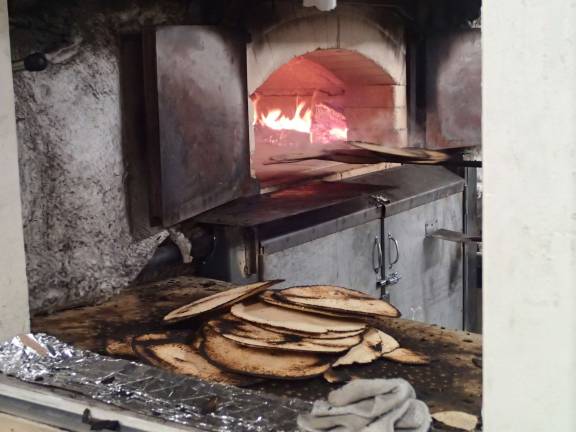
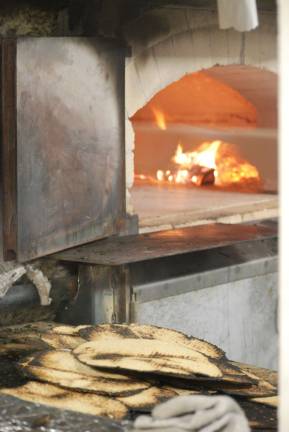
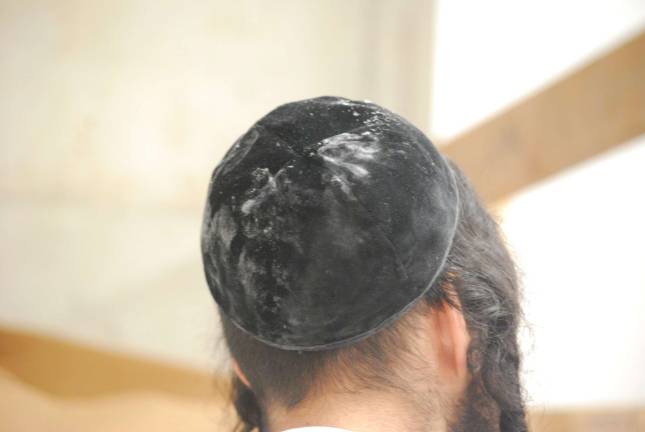
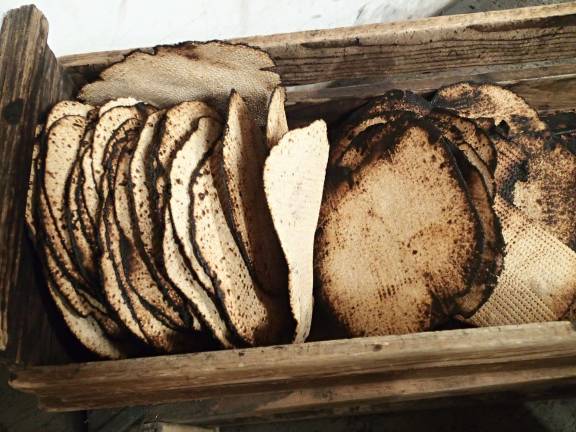
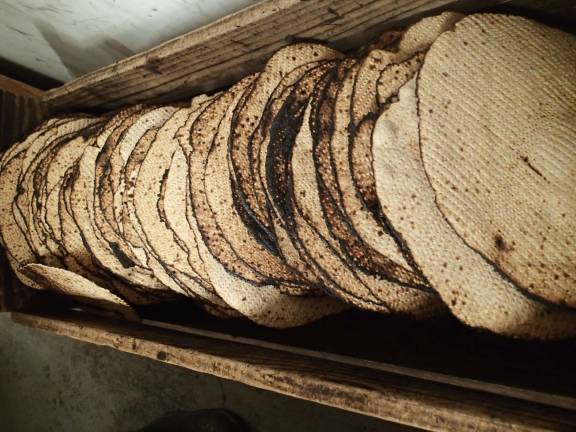
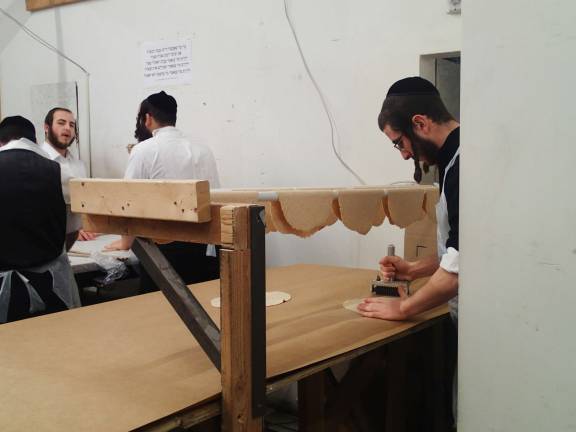
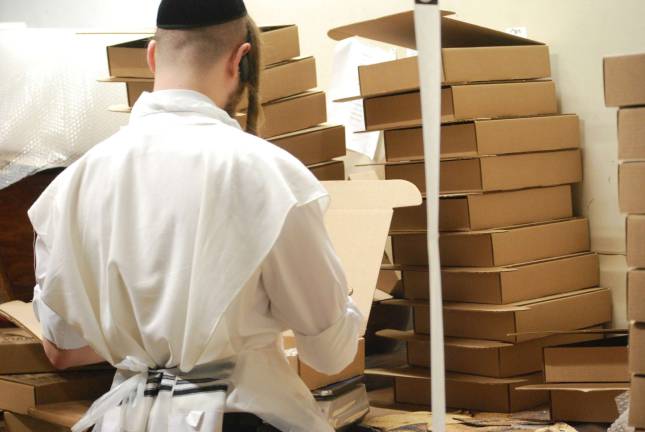
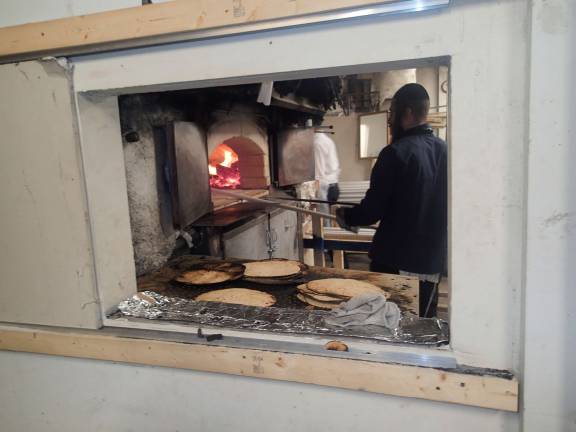
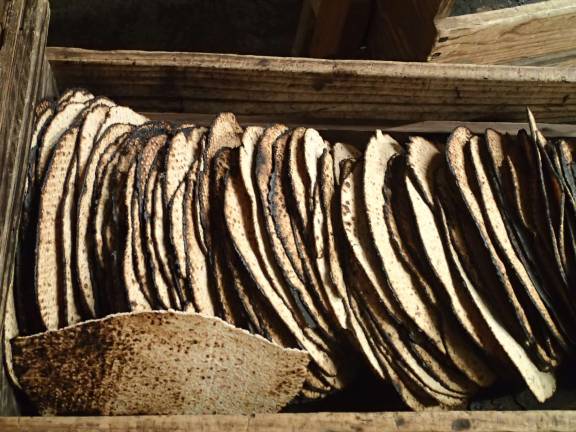
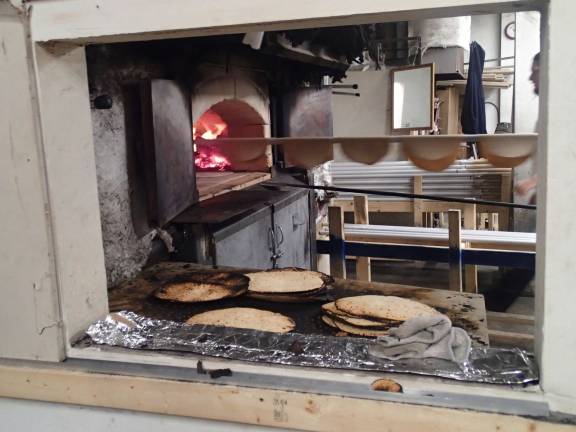
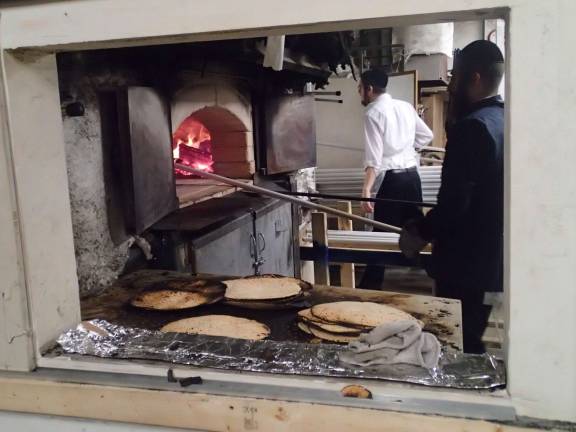
A rare peek inside a Hasidic bakery
Yisroel Bass still wears a plastic apron over his white shirt and black suspenders. The rest of the guys have ripped their aprons off and filed out of the bakery for a 45-minute lunch-and-cigarette break, but Bass, 28, has no end of things to do.
He's dressed much like the other 20 men in here, with his shirt sleeves rolled to the elbow, except that on his feet are a pair of telltale Muck boots. Bass is a farmer, not so much a baker, although farmers these days have to be jacks of many trades.
On his way out to have a smoke, a young blonde man left his credit card behind with Bass. He wanted to buy a box of the matzo that had just come out of the oven.
Bass thumbs his smartphone, processing the transaction with practiced hands. This might be the ultimate compliment. The men employed at this hole-in-the-wall-bakery – half of whom look like teenagers – know their unleavened bread. They churn it out at an urgent pace in the months leading up to Passover. To the sound of loud thumping Yiddish music, something between techno and klezmer, they work in a human production line to knead dough, roll it into discs, and get them into and out of the maw of a wood-and-coal-fired oven in 18 minutes, the maximum amount of time kosher law allows.
And, “well, they get to taste it,” said Bass. So if one of these guys who lives and breathes elite matzo wants to pay $34 for this one-pound box, that's saying something.
A self-taught farmer, Bass grows thousands of pounds of organic whole wheat and spelt at Yiddish Farm, a 40-acre nonprofit teaching farm that he founded in Goshen, NY. The farm's mission is to reclaim the Yiddish language -- a language that so fascinated Bass that he taught himself to speak it, as a teenager growing up on Long Island, as a way to reconnect with his Jewish roots.
He now speaks Yiddish a mile a minute, to the guys at the bakery, to a friend on the phone, throwing in the occasional English word: “organic,” “whole wheat” and “spelt.” I was surprised to learn it wasn't his native language, and that Bass didn't grow up Hasidic. As an outsider, you'd never know it. The father of two wears payot – the traditional sidelocks -- and a beard, avoids shaking hands with women, says prayers before and after meals, and devotes much of his life to crafting the centerpiece of the Passover table.
Bass' matzo is the antidote to supermarket matzo, according to a shout-out in the New York Times food section in 2016. There's good reason it costs more by weight than filet mignon. It's not just organic, and handmade, and local, and kosher, but also “shmura,” or “guarded,” the most rigorous standard in the production of matzo. A rabbi comes to the wheat field before the harvest, Bass explained, to make sure that the grain hasn't pre-sprouted. You can see it when grain gets wet and sprouts, said Bass. “It blows up a little bit.” Sprouted grain is considered leavened, and therefore not kosher – and it also diminishes baking quality, Bass said.
The rabbi also checks that certain kinds of weeds aren't growing among the wheat, said Bass, like wild garlic, whose bulbettes can contaminate the harvest and make matzo spicy and bitter.
No, shmura is not like “super-kosher,” Bass says, his patience wearing thin at my suggestion. (He does have a newborn baby at home, and nights have been rough.) Simply put, what separates Bass' matzo is the “intention in the process.”
For one special customer, Bass goes so far as to crank his grain into flour by hand. “The rabbi doesn't eat anything but hand milled,” he shrugged. Some highly observant Jews prefer to harvest the wheat for their Passover matzo themselves rather than have it go through a combine. They'll show up at the farm with garbage bags and spend all day threshing.
The Hasidic community makes up Bass' biggest customer base. Jewish law says that when available, you should use shmura matzo for the eight days of Passover, he explained. But whether they're observant or not, said Bass, “most people will use these for the Seder because of the tradition associated with it. And they're prettier.”
This year was his best harvest yet, so abundant that he left a sliver of the field for visiting school kids to take some wheat home. He has enough flour to scale up his matzo making from a little over 1,000 pounds to nearly 5,000 pounds. But he won't do it unless he's got a purchase order in hand. He's been burned before.
The price of Bass' matzo is the sticking point, but you can't compare it to machine-made stuff, he said. “Look, how many people are working here? That guy, he's milling by hand. The guy who puts it in the oven gets paid the most because he's standing in front of a thousand-degree oven all day getting burned.” What's more, city buyers aren't going to find matzo more local. The vast majority of wheat for shmura matzo comes from Arizona, where dryer conditions make premature sprouting less likely – and out there, it's not grown by Jews.
If anyone can convey what's special about his matzo to a secular buyer, Bass, with a Muck boot in both worlds, is the one to bridge the gap. It's a privileged position, and as a struggling farmer, Bass needs to use it to his advantage.
He's doing just that. At the moment, he's got a side gig working for New York City as a liaison to the Hasidic communities in Brooklyn, educating them about the city's new composting program. That job, which requires commuting back and forth, will dovetail nicely with sales trips to the city.
Come January, Bass spends more time than he'd like here at Monsey Matzo Bakery -- which, confusingly, is actually located in Kiryas Joel. It's tucked away in the back of a housing development, its door marked only by the number 003 and a mezuzah, its doorstep littered in cigarette butts. Bass spends more money than he'd like here, too. Of all his expenses, the bakery, where he pays per pound of flour processed, is the biggest.
The first time I visited the bakery, Bass showed me the tiny, windowless room in the back where he grinds his wheat into flour. A giant of a man, Bass doesn't mind working 17-hour days in his fields at the height of summer. But the days cooped up in the “organic room” feel longer. “It's kind of a really miserable place to work,” he said. Bass had to pay $1,000 to get this space certified as organic, which was annoying since that was on top of the grand he'd already laid out for his farm's organic certification.
He cloisters himself in this closet with his 300-pound, 55-gallon drums of the wheat that he lugged over in his buddy's truck. (His broke down). He grows two kinds: whole wheat and spelt, which is one of the five biblical grains permitted in Passover tradition, and commands the highest price. He grinds the wheat into flour with an electric mill (which, for awhile, was working extra slow because he'd put it together backwards). He sifts out the bran and straw with a “very miserable” vibrating sieve. He brings the bran back to the farm to feed to his chickens and put on his potatoes – it's supposed to help with potato beetles by messing up their digestive systems. Finally he packs his flour into the three-pound plastic bags the bakery requires. He scrawls quantities on a two-by-four nailed into the concrete wall as he works. “I feel like I'm in prison sometimes,” he said. No Rumpelstiltskin has showed up yet to lend a hand.
The second time I visited the bakery, the crew was halfway through its second day baking with Bass' flour. Bass, let out of his closet, was helping with the boxing. They had worked out some early kinks, possibly having to do with a different sifting than they were used to, and now they were into the third barrel of whole wheat flour and working fast and steady. Every 10 seconds or so a disc of dough flew from the first table to the second, where a guy wearing glasses scored each disc with a rolling tool – giving them those lines that make matzo easy to break – then hung them on a long pole. Another guy fetched the pole and carried it to the oven in the next room. Once the matzos emerged from the oven, prettily blackened around the edge, a guy with a Bluetooth in his ear packed them one by one into a cardboard box. He layered bubble wrap between each piece, weighed the box, and sealed it with a Yiddish Farm sticker.
He used bubble wrap instead of the usual nest of paper, because these early samples were going to be shipped to potential customers in the city. As for what buyers Bass was courting, his lips were sealed.
Bass dreams of having his own on-farm matzo bakery one day, but that's a $150,000 project. When will it happen? “When somebody gives us money to do it,” Bass said. He's a nonprofit, after all. Unpredictable cash flow means he has to be nimble, making do with what he's got, but ready to expand at a moment's notice. When Yiddish Farm won a $42,000 grant for value added producers from the United States Department of Agriculture two years ago, Bass bought a gravity wagon that holds 10,000 pounds of grain in the field. That boosted his output from about 200 pounds of wheat to 1,200 pounds, and made life a lot less stressful. No longer did he have to hustle back and forth to the barn with each load of hay, scanning the sky for hint of a fast-moving rainstorm that could ruin the day's harvest.
If he had his own bakery, he could use his own boxes, his own field workers, his own organic certification. He'd be free from the middleman, and from the miserable closet.
In the meantime, he writes grants and newsletters, and brainstorms creative ways to make money, like a new CSA where customers can buy his extra whole wheat or spelt flour. He has learned to do his big annual fundraiser right after Passover, when spring is in the air and “people have the taste of matzo.”